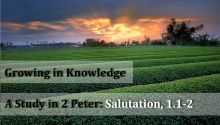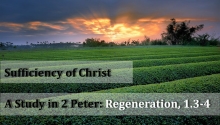
We ended last week learning about false teachers, and Peter’s warning against following them. Today we examine in detail the dangers of falling away from Jesus to follow another gospel. Yes, another gospel, for there are many out there. From the “eat, drink and be merry” gospel of the epicureans to the strict living in a mental construct of the stoics, very little has changed over the centuries. Each false gospel has its appeal, for if they didn’t they wouldn’t be so tempting. Falling to any temptation has its consequences, but falling to another gospel involves one day experiencing the wrath of God.

Last week in our series we began uncovering Peter’s explanation of how Jesus is sufficient for Christian living through three elements. The first of these elements is regeneration, defined as restoring one’s inclination toward righteousness and a right relationship with God. The second is sanctification, the process of purification and spiritual growth. Today we take on the third truth, that Jesus is sufficient for our eternal security. I realize that term is loaded, and ask that you set aside what you think you know so you can rightly understand what Peter wants you to know.

Last week we barely got started, but start we did, a study of Peter’s second letter. The takeaway from our introduction is Peter’s Big Idea, that as we patiently wait for our Savior’s return we combat apostasy be increasing in our knowledge of God. During this study, I’ll be using a free online study tool from Faithlife. At the end of our study I’ll be reviewing the tool and its suitability for use in a group setting. But that comes later, today we are furthering our understanding of 2 Peter and there is no better place to start than with the salutation.

The story of Abraham and Isaac is a difficult reading (Genesis 21). Why would God ask Abraham to offer up Isaac as a sacrifice? The Bible only hints at one reason, that it was a test of Abraham’s faith. This answer is not very satisfying, however, to most believer’s. After all, God knows every person’s heart does he not? He not only knows our heart, but he can harden hearts (as in the case of Pharaoh) and takes joy when we share his heart (as David did). I believe there are other, better reasons if only we start at the beginning.

The Lord had revealed to Peter that his death was eminent (2 Peter 1.14) and Peter, in light of this, is passing on what he believes is most important and pressing to Jesus-followers of his day. Obviously, that makes the content of this letter important to us as well. What may be surprising to many is just how much time Peter spends addressing false teachings and their teachers. Nearly half the letter exhorts, exposes and warns believers about those who would lead them astray and overcomes the objections such men raise against their faith – objections that continue to this day.

Yesterday we learned that Peter is helping to define the Christian life through a series of three elements; the first of these elements is regeneration. We defined regeneration as restoring one’s inclination toward righteousness and a right relationship with the Creator. The second of these three elements is sanctification. This term is used widely in both testaments to signify something or some people as set apart as sacred. In Peter’s use, the term is used more specifically as “the process of gradual purification from sin and progressive spiritual growth that should mark the life of the believer.”

Yesterday we talked about two things modern believer’s need, dedication to our mission and the courage to act on the mission. Paul certainly engaged the culture of the Athenians, but there is another apostle who confronted his culture in a less cerebral fashion, a manner in which some of our readers may find a little more familiar. The apostle Peter was like a force of nature at times, and his two letters are no exception to his confrontational style. While we have already completed a study of 1 Peter, now may be an opportune time to study 2 Peter.

Over the last five years or so the Western world has become increasingly polarized over politics and, in America at least, Christians have become willing participants. I’m not implying this is a good or bad thing, only that we need to make sure our response to the world is properly measured and reflect Biblical thought. Pastor Mark Anthony of Grace Fellowship in York, Pennsylvania recently wrote an open letter (published here) rightly criticizing an unnamed Christian organization’s response to the president’s recent ban on transgender individuals serving in the US military. This is, partially, a response to him.

Peter pokes fun at Paul saying some of his teachings are hard to understand, but Peter is no slouch when it comes to teaching truth. His approach may be different, but he brings home the tough teachings as well as anyone. Take these first few verses of chapter one for example. There is truth well communicated in the opening verses with just a surface reading, but its when we start asking questions about what is written that the deeper meaning shines through. Let’s take a look at verses 5 through 7 to learn how to read the rest of Peter’s writings.

When I started working in IT, like most people, I started in a call center. This can be either a good or bad experience for beginners, and the experience has nothing to do with one’s equipment or the attitudes of the customers that call. It has everything to do with the training one receives. My experience was a good one. My managers made sure I had the technical know-how before they hired me, but once in the center my first two weeks were spent shadowing other techs, then having them shadow me as I started taking calls. That time was invaluable.

During his second missionary journey Paul traveled to one of the great cities of his day and what he noticed was a culture in confusion – a culture ripe for the gospel message. The city was a jewel of the Roman empire whose culture, artwork and practices started long before there was a Roman power. The city was full of temples, but none were as great as the acropolis which stood on high ground and was the center of pantheon worship. People came from around the world to worship, and they still do. The city is Athens, and Paul had his work cut out for him.

It was a dark time in Israel’s history. They had a streak of bad kings, leaders who introduced idols and the worship of foreign Gods. They joined the royal house with those of other nations to establish peace rather than depending upon the Lord. But there was one king who went further than the others. King Jehoiakim succeeded his brother, a brother who was exiled to Egypt. Jehoikim didn’t care as long as he held the throne. Yet he didn’t just play with evil as his predecessors had, he purposely suppressed the word of God and advanced a conspiracy to keep it buried.
